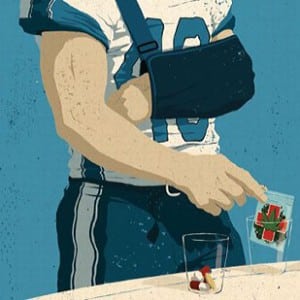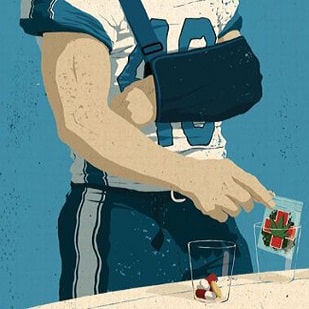
I planned on writing an article tonight about cannabis and active professional athletes, but a Twitter conversation changed my focus this evening. The Twitter conversation started when a Baltimore Ravens fan replied to a tweet by NFL player Eugene Monroe of an article I wrote Sunday. Below is the exchange:
@TheSeventyFifth @thatjohnnygreen Bro Far be it me to stop someone from standing up what you believe in but I also think you should focus
— Eli Ford (@FordEford71081) March 22, 2016
@TheSeventyFifth@thatjohnnygreen on the Ravens
— Eli Ford (@FordEford71081) March 22, 2016
I then felt the need to respond to Mr. Eli Ford. I don’t think that Eli Ford meant to ruffle any feathers with his tweets, but I did feel the need to state some opinions and try to educate Mr. Ford. So I tweeted back stating:
The health of #Ravens players, and all #NFL players, is why it’s vital 4 @TheSeventyFifth to keep speaking. Cannabis helps. @FordEford71081
— Johnny Green (@thatjohnnygreen) March 22, 2016
That then led to some back and forth between the Ravens fan and Eugene Monroe, with Eugene Monroe providing some quality responses and a link to a great resource database. I’d imagine the conversation will continue and if you want to join, click on the links in the embedded tweets and provide your two cents. Much like the fan Eli, many other fans need to be educated on the benefits of medical marijuana as a treatment for sports injuries. Injuries have been a hot topic lately, and I don’t see that changing any time soon.
It seems like every time I’m on social media or browsing media sites, more and more the conversation is on injuries, especially brain injuries. Opponents will want to ask for research, and facts, and blah blah blah. That is always a delay tactic, because if opponents truly wanted to know what the research says they would realize it’s not hard to find. I Googled ‘brain injuries marijuana’ and on the first page of returns is a government study that found the following, via the study’s abstract:
Traumatic brain injury (TBI) is associated with significant morbidity and mortality. Several studies have demonstrated neuroprotective effects of cannabinoids. The objective of this study was to establish a relationship between the presence of a positive toxicology screen for tetrahydrocannabinol (THC) and mortality after TBI. A 3-year retrospective review of registry data at a Level I center of patients sustaining TBI having a toxicology screen was performed. Pediatric patients (younger than 15 years) and patients with a suspected nonsurvivable injury were excluded. The THC(+) group was compared with the THC(-) group with respect to injury mechanism, severity, disposition, and mortality. Logistic regression was used to determine independent associations with mortality. There were 446 cases meeting all inclusion criteria. The incidence of a positive THC screen was 18.4 per cent (82). Overall mortality was 9.9 per cent (44); however, mortality in the THC(+) group (2.4% [two]) was significantly decreased compared with the THC(-) group (11.5% [42]; P = 0.012). After adjusting for differences between the study cohorts on logistic regression, a THC(+) screen was independently associated with survival after TBI (odds ratio, 0.224; 95% confidence interval, 0.051 to 0.991; P = 0.049). A positive THC screen is associated with decreased mortality in adult patients sustaining TBI.
Traumatic brain injury is just one of many injuries that scientific studies have found that cannabis can help treat. Unlike harmful pharmaceutical painkillers, which is the treatment of choice for many professional sports league doctors and are perfectly legal, medical marijuana has never killed anyone. Medical marijuana is proven to be safer than painkillers, and in a lot of cases, more effective. So why would a fan not support an athlete using it?
As I tweeted back to the fan, no one is saying it’s vital to partake, just that it’s vital to be allowed the option to do so if a doctor approves. If a player doesn’t want to use medical cannabis, they don’t have to. But if they want to, what’s wrong with it? Minus the rhetoric, minus the reefer madness, minus the catch phrases and debunked claims, what is wrong with a professional athlete using medical cannabis? Especially in states that have legalized medical cannabis?
As a fan, I want the players that I root for to be healthy, happy, and live long lives. I want to be able to see them at events and games decades after they have retired, and to be living well in their old age. What I don’t want to see is someone that I used to think was a larger than life figure, and could do anything on the field or court because of their athleticism, wheeled into a game or event because they can barely walk. To see them suffering because of the injuries they sustained, and equally or even more so, the painkillers that were pushed on them by team doctors and organizations. I also don’t want to see players taking their own lives because of mental illnesses due to brain injuries. There has to be a better way.
As fans and consumers of professional sports, we need to speak out. We need to contact teams and leagues and let them know that we want to see players treated with compassion, and not persecuted because they want to make the safer choice to treat their injuries, and the aches and pains that go with them. I want to see my players on the field while they are in their prime, and smiles on their faces when they are retired and still enjoying the game they played. I want to hear stories about the glory days from the past, and not hear about horror stories from the present about unfortunate painkiller/injury related premature deaths that could have been potentially prevented by the use of a plant.





